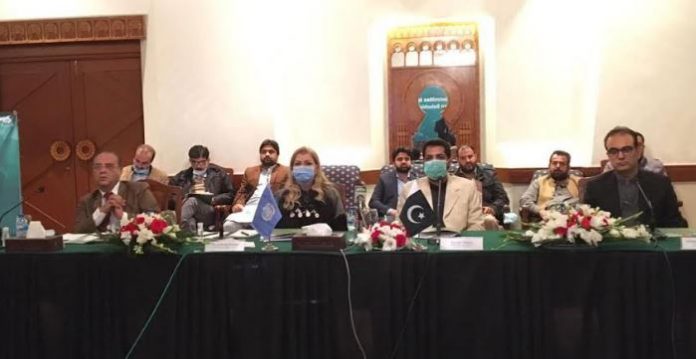DNA
QUETTA , DEC 16 – The Steering Committee on the Rule of Law (RoL) Roadmap Balochistan convened its fourth stock take meeting on 16 December 2020 in Quetta. The session concluded with a firm commitment made by Mr. Ziaullah Langove, Minister Home & Tribal Affairs, GoB towards advancing the criminal justice sector reforms envisioned under the Rule of Law roadmap in Balochistan.
Balochistan has achieved significant milestones under the RoL Roadmap Project since its inception to date. This project is being implemented by UNODC and supported by the British High Commission. Balochistan has succeeded to establish a fully functional governance mechanism that drives evidence-based and cross institutional RoL Reform which was possible due to the commitment and dedication of the government of Balochistan and all stakeholders to make this reform meaningful and sustainable.
The progress made under the roadmap was applauded by all the stakeholders despite the unprecedented challenges of COVID-19. The participants took stock of the achievements, lessons and exchanged views on next prospects for cooperation. Mr. Hafiz Abdul Basit, Additional Chief Secretary, Home & Tribal Affairs, GoB appraised the SC members of another major milestone, which is the final approval of the PC-1 by the Government, committing the amount PKR 500 million for the RoL reform in the province under the Roadmap. He further thanked all those who have been working relentlessly to get this approval.
Speaking on the occasion, Mr. Jeremy Milsom, Representative, UNODC Pakistan emphasized that through the coordination efforts with the Government of Balochistan, considerable progress under the Rule of Law reforms has been achieved. However, the time is now to continue pushing forward and move the needle on implementing a robust set of reforms to align the criminal justice institutions to reinforce human rights and address underlying challenges of gender-based violence through promoting the rule of law and democracy in Balochistan.
Key findings from the assessment survey on citizens’ perception regarding the performance of criminal justice institutions and the baseline study in Balochistan were presented. While the findings of the survey and baseline provide a benchmark to use a demand-driven approach through citizens’ perspectives to enhance legitimacy, fairness, efficiency and transparency of the criminal justice sector towards ensuring safety and security of the citizens, the baseline also provides a yardstick for criminal justice institutions to measure their performance and progress against RoL provincial set targets.
The Delivery Unit apprised the forum further on the progress made to date, particularly on the digital platforms through a demonstration of the website which is continuously being updated to project the dynamic nature of the criminal justice reforms led by the RoL roadmap. The digital interface of the roadmap is powered by a dashboard that provides a convergence platform through evidence-led data analytics to inform both policy and practice of criminal justice institutions.
The Roadmap project is recognized as a groundbreaking and innovative approach to drive evidence-based policy and reform through a robust governance structure and regular stock takes.
The organizers of the steering committee meeting thanked all stakeholders for their participation and acknowledged UNODC’s efforts and the British High Commission for their continued and generous support.

















